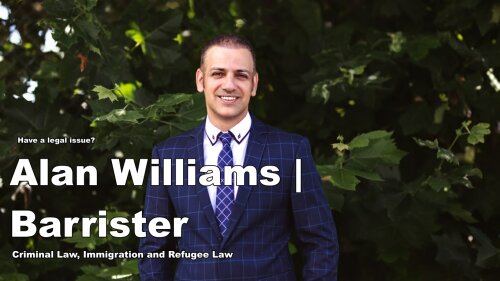Best Bail Bond Service Lawyers in New Zealand
Share your needs with us, get contacted by law firms.
Free. Takes 2 min.
Or refine your search by selecting a city:
List of the best lawyers in New Zealand
About Bail Bond Service Law in New Zealand
Bail bond services in New Zealand facilitate the release of individuals who have been arrested and are awaiting trial. The primary purpose of bail is to ensure that a defendant returns to court for their trial while still enjoying a degree of freedom. Unlike some other countries, New Zealand does not rely heavily on private bail bond services; the process is mostly managed through the court system. Decisions about granting bail are determined by a judge who will assess factors such as the severity of the alleged crime, the defendant's criminal history, and the likelihood of the defendant appearing for trial.
Why You May Need a Lawyer
There are several situations where you might need legal help in relation to bail bond services in New Zealand:
- Application for Bail: Securing bail in certain cases can be complex, especially with serious charges or repeat offenses. Legal representation can help make a strong application.
- Violation of Bail Conditions: If someone is accused of breaking the conditions of their bail, legal advice is crucial to navigate potential consequences.
- Understanding Bail Conditions: A lawyer can help explain complex conditions and ensure compliance to avoid additional legal trouble.
- Appealing Bail Decisions: If bail is denied, a lawyer can assist in appealing this decision and presenting a compelling case for release.
Local Laws Overview
Key aspects of New Zealand's laws regarding bail include:
- Bail Act 2000: This is the primary legislation governing bail, setting out the criteria and processes for granting bail.
- Types of Bail: Different situations warrant different types of bail, such as police bail, court bail, and High Court bail.
- Conditions: Bail often comes with conditions, which could include regular check-ins, restrictions on movement, or not contacting certain individuals.
- Factors Influencing Bail Decisions: Courts consider the seriousness of the crime, the accused's criminal history, risk of flight, and potential threat to public safety.
Frequently Asked Questions
What is the purpose of bail?
Bail allows a person accused of a crime to await trial without remaining in custody, ensuring their return to court while maintaining some personal freedoms.
Can anyone apply for bail?
Yes, almost anyone can apply for bail, but granting it depends on the nature of the crime and other judicial considerations.
What factors will the court consider when granting bail?
Court considerations include the alleged crime's seriousness, the accused's past behavior, potential flight risk, and threat to community safety.
What are common bail conditions?
Common conditions may include reporting to a police station regularly, avoiding certain areas, or refraining from contacting specific people.
Can a bail decision be appealed?
Yes, decisions can be appealed, typically requiring legal assistance to navigate the process effectively.
What happens if someone fails to meet bail conditions?
Failing to adhere to bail conditions can lead to bail revocation and potentially being held in custody until trial.
Is there a difference between police bail and court bail?
Yes, police bail is granted by the police after arrest, pending a court appearance, while court bail is granted by a judge after a hearing.
How long does it typically take to secure bail?
This can vary widely based on case complexity, the accused's circumstances, and the court’s schedule.
Are sureties required in New Zealand for bail?
Sureties, or financial guarantees, are not commonly used in New Zealand's bail system, differing from the approach in some other countries.
Can bail be revoked or conditions changed?
Yes, changes or revocations can occur based on new evidence or breaches of existing conditions, often requiring legal intervention.
Additional Resources
For further assistance and information, consider these resources:
- New Zealand Ministry of Justice: Offers comprehensive legal information, including bail processes.
- Community Law Centres: Provide free initial legal advice to individuals navigating bail-related issues.
- Legal Aid Services: Available to those who qualify financially, providing representation and advice.
- New Zealand Law Society: Offers directories to find qualified legal professionals.
Next Steps
If you require legal assistance in the realm of bail bond services, consider the following steps:
- Consult with a Lawyer: Seek advice from a lawyer experienced in criminal law and bail procedures.
- Assess Your Situation: Gather all relevant information about the charges and any previous legal encounters.
- Understand Legal Rights: Ensure you are fully informed about your legal rights and obligations under New Zealand law.
- Prepare for Court Hearings: Work with your lawyer to prepare necessary documentation and arguments for bail applications and hearings.
Lawzana helps you find the best lawyers and law firms in New Zealand through a curated and pre-screened list of qualified legal professionals. Our platform offers rankings and detailed profiles of attorneys and law firms, allowing you to compare based on practice areas, including Bail Bond Service, experience, and client feedback.
Each profile includes a description of the firm's areas of practice, client reviews, team members and partners, year of establishment, spoken languages, office locations, contact information, social media presence, and any published articles or resources. Most firms on our platform speak English and are experienced in both local and international legal matters.
Get a quote from top-rated law firms in New Zealand — quickly, securely, and without unnecessary hassle.
Disclaimer:
The information provided on this page is for general informational purposes only and does not constitute legal advice. While we strive to ensure the accuracy and relevance of the content, legal information may change over time, and interpretations of the law can vary. You should always consult with a qualified legal professional for advice specific to your situation.
We disclaim all liability for actions taken or not taken based on the content of this page. If you believe any information is incorrect or outdated, please contact us, and we will review and update it where appropriate.
Browse bail bond service law firms by city in New Zealand
Refine your search by selecting a city.
















